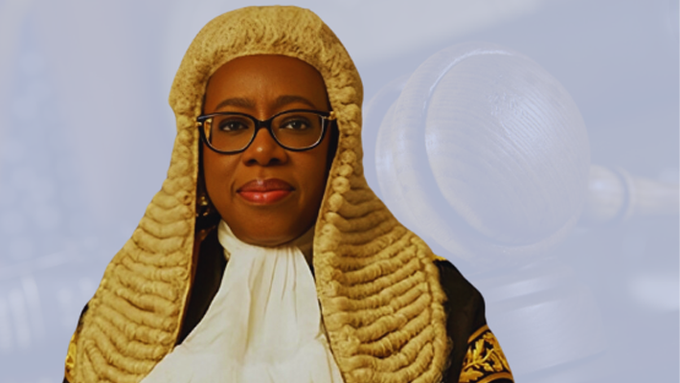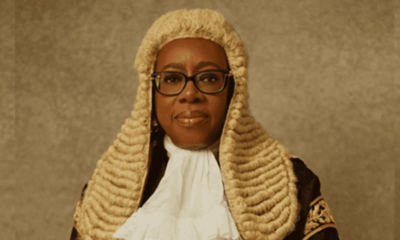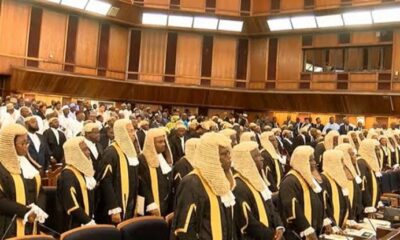NEWS
Justice Kudirat Kekere-Ekun biography and more

All you need to know about the 23rd serving Justice of the Supreme Court of Nigeria Kudirat Kekere-Ekun can be accessed on Topnaija.ng
This online news platform reports that Justice Kudirat Motonmori Olatokunbo Kekere-Ekun took the oath of office and signed the oath register on Friday morning at the Council Chamber of the State House, Abuja.
Kudirat Kekere-Ekun succeeds Ariwoola, who assumed office on June 27, 2022, and bowed out on Thursday, upon attaining the mandatory retirement age of 70 years.
All you need to know about Justice Kudirat Kekere-Ekun
Early Life and Education
Born May 7, 1958, in Lagos State, Kekere-Ekun attended primary school at St. Mary’s School in Lagos. For her secondary education, she attended Queens College, Yaba, Lagos.
Justice Kekere-Ekun obtained her Bachelor of Laws (LL.B.) degree from the University of Lagos in 1980. She was called to the Nigerian Bar in 1981 after completing the mandatory one-year program at the Nigerian Law School, Lagos.
She furthered her education by obtaining a Master of Laws (LL.M.) degree from the London School of Economics and Political Science in 1983.
Early Career
Justice Kekere-Ekun began her legal career as a State Counsel at the Lagos State Ministry of Justice, where she worked from 1982 to 1989. During her time there, she was involved in various aspects of legal practice, including drafting legal opinions, prosecuting cases, and representing the state in legal matters.
She later transitioned into private legal practice, working with private law firms and expanding her experience in different areas of law.
In 1996, Justice Kekere-Ekun was appointed as a Judge of the High Court of Lagos State, where she presided over numerous cases. Her judicial career saw a significant advancement in 2004 when she was elevated to the Court of Appeal, one of the highest appellate courts in Nigeria. As a Justice of the Court of Appeal, she delivered several notable judgments and contributed to the development of Nigerian jurisprudence.
On June 8, 2013, Justice Kekere-Ekun was appointed as a Justice of the Supreme Court of Nigeria, the highest court in the country. Her appointment was widely praised, and she has continued to serve with distinction in this role, participating in landmark decisions that shape the Nigerian legal landscape.
Landmark judgements
Justice Kekere-Ekun has delivered and participated in several landmark judgments and rulings during her tenure as a justice of the Supreme Court of Nigeria. Some of her notable judgments include:
Hope Uzodinma v. Emeka Ihedioha: This case involved the 2019 Imo State gubernatorial election, where Uzodinma challenged Ihedioha’s victory. Kekere-Ekun led the controversial Supreme Court judgement that declared Uzodinma the winner, based on the inclusion of results from 388 polling units that had previously been excluded. She read the judgment in January 2020.
Adeleke v. Oyetola: This case involved the Osun State governorship election dispute between Senator Ademola Adeleke and Governor Gboyega Oyetola. Adeleke challenged the election results, alleging irregularities and misconduct. Justice Kekere-Ekun, was part of the panel of justices that affirmed the election of Gboyega Oyetola as the governor of Osun State, dismissing the appeal filed by Adeleke. The Supreme Court’s decision was based on the failure of the appellant to prove substantial non-compliance with the Electoral Act during the election.
Nyesom Wike v. Dakuku Peterside: This case revolved around the 2015 Rivers State governorship election, where Nyesom Wike was declared the winner, but the results were contested by Dakuku Peterside. Justice Kekere-Ekun was part of the Supreme Court panel that upheld the election of Nyesom Wike as the governor of Rivers State.
The court dismissed the appeal filed by Peterside, affirming that the election was conducted in substantial compliance with the law. Kekere-Ekun held that While the Electoral Commission is duly conferred with powers to issue regulations, guidelines or manuals by the Electoral Act, so long as an act or omission regarding such regulations or guidelines is not contrary to the provisions of the Act itself, it shall not of itself be a ground for questioning the election. She held that the use of the card reader has not done away with manual accreditation provided under
Center for Oil Pollution Watch v. NNPC: In this case, Justice Kekere-Ekun ruled that a party directly affected by development can approach the court for redress. This decision expanded the scope of public interest litigation in Nigeria.
Awards and Recognitions
Justice Kekere-Ekun has received various awards and recognitions for her contributions to the legal profession and the judiciary in Nigeria. She has been honored with national awards and gender advocacy awards one of the leading female figures in Nigeria’s judiciary. Justice Kekere-Ekun has also received awards from various legal associations, such as the Nigerian Bar Association (NBA), for her excellence in the legal profession.









![CJN swears in 18 Appeal Court Judges [FULL LIST]](https://topnaija.ng/wp-content/uploads/2021/03/Honourable-Justice-Ibrahim-Tanko-Muhammad-376x240.jpg)
![CJN swears in 18 Appeal Court Judges [FULL LIST]](https://topnaija.ng/wp-content/uploads/2021/03/Honourable-Justice-Ibrahim-Tanko-Muhammad-80x80.jpg)








